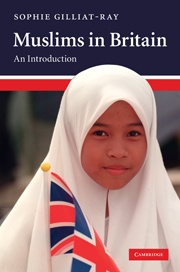Book contents
- Frontmatter
- Contents
- List of figures
- List of tables
- Preface
- Acknowledgements
- List of abbreviations
- PART I HISTORICAL AND RELIGIOUS ROOTS
- PART II CONTEMPORARY DYNAMICS
- 5 Profiling British Muslim communities
- 6 Religious nurture and education
- 7 Religious leadership
- 8 Mosques
- 9 Gender, religious identity and youth
- 10 Engagement and enterprise
- Epilogue
- Appendix: Source notes for researchers
- Glossary
- References
- Index
6 - Religious nurture and education
Published online by Cambridge University Press: 05 June 2012
- Frontmatter
- Contents
- List of figures
- List of tables
- Preface
- Acknowledgements
- List of abbreviations
- PART I HISTORICAL AND RELIGIOUS ROOTS
- PART II CONTEMPORARY DYNAMICS
- 5 Profiling British Muslim communities
- 6 Religious nurture and education
- 7 Religious leadership
- 8 Mosques
- 9 Gender, religious identity and youth
- 10 Engagement and enterprise
- Epilogue
- Appendix: Source notes for researchers
- Glossary
- References
- Index
Summary
INTRODUCTION
There are numerous Qur'ānic verses and sayings of the Prophet Muhammad regarding the formation, protection and continuity of the family. Approximately one-third of the legal injunctions in the Qur'ān deal with family matters (Waddy 1990). The centrality of the family in Islam is also reflected in the complexity of jurisprudence relating to marriage and the family in Islamic law, and the extent to which the ‘ulamā’ direct their scholarly endeavours towards interpretation and application of legal principles in this area. Between 1992 and 1997, over 500 questions were posed to the late Dr Syed ad-Darsh, in his ‘Ask the Imam’ column in the British Muslim newspaper Q-News: most were related to family matters (Bunt 1998: 107).
According to Islamic teaching, everyone is born a Muslim, and Islam is the ‘natural’ religion of humankind (dīn al-fitra) (Murata and Chittick 2000). Whether this Muslim religious identity flourishes depends upon family upbringing, wider social environment and education. This chapter examines the two main institutions involved in the religious nurture and socialization of British Muslims: the family, and the education system (and especially that offered by Islamic institutions). British Muslims recognize the critical importance of a strong family life and effective education for the future transmission of Islam. This explains the degree to which they have sought to preserve, protect and strengthen these two central social institutions and their associated Islamic values against what is often regarded as the spiritually corrupting influence of secularism in wider British society (Bunt 1998: 103).
- Type
- Chapter
- Information
- Muslims in Britain , pp. 130 - 156Publisher: Cambridge University PressPrint publication year: 2010

